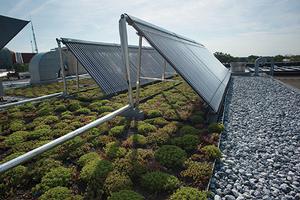AU is First Carbon Neutral University in the United States

Eight years after it publicly pledged to become carbon neutral by 2020, American University achieved its goal—two years ahead of schedule. AU is the first carbon neutral university in the nation, as well as the first urban campus and the first research university to accomplish this achievement.
“We wanted to demonstrate leadership and innovation in addressing the serious social, economic, and environmental issues associated with global warming,” says President Sylvia M. Burwell. “Having a net-zero carbon footprint reflects our commitment to acting on our values and leading into the future.”
To earn official designation as carbon neutral, AU had to meet guidelines set by Second Nature, a nonprofit dedicated to accelerating climate action in—and via—higher education. The strategy includes reducing energy use per square foot and producing renewable energy on campus, using green power, and purchasing strategic offsets.
AU’s electricity is 100 percent renewable. Fifty percent comes from solar power panels at a solar farm in North Carolina. The site was the largest solar purchase installation by a non-utility company at construction in 2014. The remainder comes from renewable energy credits.
“American University is truly raising the bar for the country,” says Timothy Carter, president of Second Nature. “With this type of leadership and innovation, we can meet our shared climate goals faster than anyone expects.”
AU’s carbon neutral campus is the result of a community-wide effort led by the Office of Sustainability, with significant contributions from Facilities Management and Transportation Programs.
While the university worked toward its goal, faculty integrated sustainability into their classes. Students in an environmental studies course, for example, organized a waste audit and an urban ecosystem walk on and around campus to collect data on their local environment.
Other students produced short films about campus waste practices and infrastructure, participated in zero-waste events, and joined in campus-wide competitions to reduce waste and the university’s carbon footprint.
Staff contributed by participating in programs like Green Office, which promotes the adoption of sustainable practices and environmental responsibility by employees in their day-to-day work.
“Sustainability is something that our students care deeply about. But more than talking about it, we have to model the behavior we want to see in the world around us,” says Kiho Kim, environmental science professor at AU. “Achieving carbon neutrality is a very strong statement about what is important to us, the entire AU community, and shows that we will continue to lead by example.”
After achieving this major milestone, the AU community looks forward to developing more innovative approaches to enhancing sustainability efforts. The university is currently undergoing a two-year hot water and heat conversion project that will drive down campus use of fossil fuels. Underground steam lines will be replaced with low-temperature hot water lines to meet campus heating needs. This new system will provide AU with reliable energy and carbon savings for the future.
“Climate change is one of the most urgent issues of our time,” says Megan Litke, director of sustainability programs. “Each organization and individual has a responsibility to act to reduce their environmental impact. I’m proud to be part of a university that takes this responsibility seriously and has acted to achieve carbon neutrality.”
